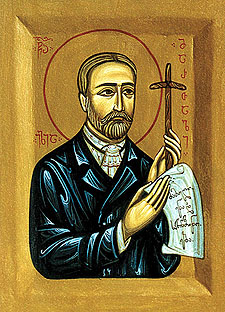|
|||
|---|---|---|---|
| This weekly bulletin insert complements the curriculum published by the Department of Christian Education of the Orthodox Church in America. This and many other Christian Education resources are available at http://dce.oca.org. | |||

Ilya Chavchavadze, or Saint Ilya the Righteous, was a poet, journalist, philosopher, lawyer and Georgian nationalist. Born in 1837, he has been called a founding father of the modern nation of Georgia, and also its uncrowned king. That is because he worked for much of his adult life, until his death in 1907, to create a stable society in his homeland. He wanted more than anything to revive the Georgian people's appreciation of their own history and ideals, which were being pushed aside by the dominant Russian Empire. As he expressed it, the Georgians had inherited three divine gifts: their motherland, their language, and their faith. It was their sacred duty to protect and live by those gifts. Ilya's faith and patriotism were developed in childhood. His family taught him the literature and history of Georgia, and inspired him with stories of national heroes. His mother, in his very early years, prayed with him and taught him about Christ and the worship of the Georgian Church. At the age of eight he was sent to study with a devout archdeacon, whose example influenced him for the rest of his life. Ilya's mother died when he was ten, and his father when he was fourteen. As an adult he wrote about his desolation at losing them, and later also his brother, in a poem called "Sorrow of a Poor Man." He continued to write poetry and novels, gaining considerable popularity and renown as the years went on. Several of his writings were translated into French, English, German, Russian and other languages. He used his growing fame to lend support to such groups as the "Society for the Spreading of Literacy among Georgians" and established centers to house historical documents and records. The early years of the twentieth century were, of course, a time of huge upheaval in Russia and all the parts of its empire. The social forces that led to the Bolshevik Revolution were increasing in strength. To the Bolsheviks and those who sided with them, Ilya Chavchavadze was a dangerously nationalistic reactionary. Their plans to overthrow the established social order certainly didn't include a Georgian state of the kind he envisioned. On September 12, 1907, Ilya Chavchavadze was ambushed and killed by a militant gang while traveling with his wife Olga. In spite of the horror she had encountered, Olga requested the court not to impose the sentence of hanging, insisting that her husband would have made the same plea. Neither she nor Ilya, who would be declared a saint by the Georgian Orthodox Church in 1987, felt any need for revenge. In the light of the Resurrection, they could forgive and accept everyone. We might say that they had absorbed a teaching of Romans 6: 13: "...present yourselves to God as those who have been brought from death to life, and present your members to God as instruments of righteousness." |
|||
